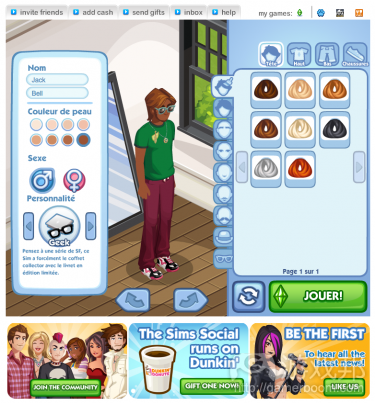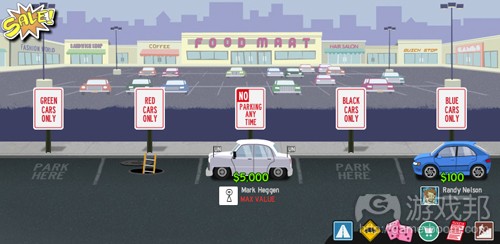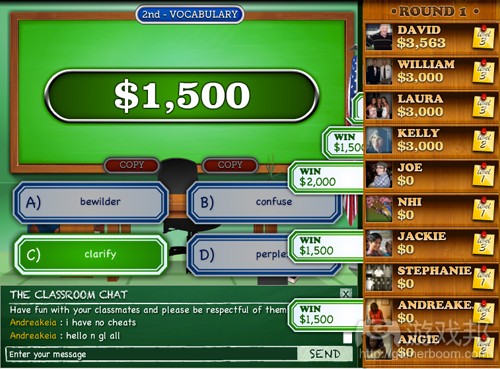每日观察:关注《模拟人生社交版》正式上线(8.19)
1)由EA的《模拟人生》工作室及Playfish伦敦工作室联合推出的《模拟人生社交版》日前结束测试并正式上线运营。
《模拟人生》原版游戏至今销量已超过1.25亿份,而最新的社交版本最近MAU也达到了485万9046。
2)网络安全服务公司Webroot最新报告指出,锁定社交网络服务的恶意插件仍然盛行,在过去九个月中,其监测到有4000个以上版本的Koobface在攻击社交网络用户(游戏邦注:调查时间为2011年6月3日至8日,共有3949名美国、英国和澳大利亚用户接受在线调查)。
遭到Koobface及其他社交网络攻击行为的美国用户数量已从2009年的8%,增长至2011年的18%。有同样遭遇的英国社交网络用户比例也从2009年的6%,增长至今年的15%。
但总体上来看,社交网络用户的个人安全和隐私意识正在不断增长。调查发现,从未修改社交网络隐私设置的用户已从2009年的37%,降至2011年的8%;在英国,这一比例也从2009年的31%降至目前的9%。
调查还指出,54%的受访者认为自己对社交网络所提供的服务选项“有点上瘾”,46%用户每天都要登录数次自己最喜爱的社交网络。
有13%受访者认为马克·扎克伯格有责任保护Facebook用户的隐私安全,有73%用户则认为保护信息安全的责任在个人而非他人。
3)据games报道,动视公司首席执行官Eric Hirshberg在日前的科伦Gamescom大会上表示,他认为当前社交游戏公司估值过高的现象并不正常,但又表示公司有兴趣向拥有大量玩家的市场开拓业务。
观察者指出,Hirshberg这番话针对的或许就是Zynga身价达135亿美元,而Rovio估值也涨至12亿美元,EA则以13亿美元高价收购PopCap Games等现象,但Hirshberg为何要一边“轻视”Facebook游戏公司,一边又表示有意进军该领域,这种模糊的立场和态度确实令人不解。
4)《Parking Wars 2》是由一款由Majesco在2008年开发的Facebook游戏《Parking Wars》继集,据AppData数据显示,该游戏本周发布至今已收获3万4127MAU,最近的DAU是1683。
这款游戏继承了原版本的玩法和机制,要求玩家购买车子,然后停在朋友的街道具赚取收入,但如果因违规停车而被朋友逮个正着,就会被开罚单。该引进了新的虚拟商品,支持玩家购买车蜡和空清新剂,此外还支持玩家通过病毒传播渠道发布游戏成就。
5)据games报道,美国热门问答节目《Are You Smarter Than a 5th Grader》日前也以多人游戏模式登陆Facebook平台,玩家在游戏中要与他人实时互动,所有玩家都要在同一个大厅中参与有奖问答,最快答对者才能赢取奖励。有幸获得问答前三名的参赛者,将进入Bonous 5th Grade Question环节继续参与挑战。
6)Kontagent日前宣布其社交应用分析工具已追踪1.5亿MAU,每天处理10亿多条用户信息(即每秒1.5万多条信息)。该公司自今年2月以来,已新增5000万追踪用户。目前有1100多款活跃的社交及手机应用采用了其分析服务,该公司客户包括育碧、时代华纳、A&E Networks、EA和腾讯等公司。(本文为游戏邦/gamerboom.com编译,如需转载请联系:游戏邦)
1)EA’s The Sims Social Debuts With 4M+ MAUs
by Frank Cifaldi
Electronic Arts’ Facebook iteration of its popular Sims franchise, The Sims Social, has ceased its public beta and is now live, the company revealed Thursday.
The game is a collaboration between EA’s The Sims Studio, based in Northern California, and Playfish’s London studio. It also marks a substantial “collaboration and partnership with
Facebook,” EA Play’s John Buchanan said recently.
“When we created The Sims Social, it was important for us to incorporate the deep gameplay nuances The Sims Studio has perfected and leverage what Playfish does best – develop compelling, cutting-edge social-gaming experiences,” said Playfish’s London Studio’s GM John Earner in a statement today.
The launch is a major move in EA’s “offensive” strategy to transform its games into services. Development on the title was rather substantial for a Facebook game, dating back to October of
last year — that’s about double the 4-6 months EA Facebook games took in the past.
The Sims has sold over 125 million games to date. The Sims Social claims 4,859,046 MAUs at press time. (source:gamasutra)
2)Study: Social Network Users Grow More Privacy Savvy, 54 Percent Feel ‘Addicted’
Robin Wauters
Webroot, which provides Internet security services for consumers and businesses, has released its third annual report on cybercrime and user behavior on social networking sites. Between June 3 and 8, 2011, Webroot sponsored an online survey of Internet users in the US, UK and Australia.
The report is based on a total of 3,949 respondents, all of which spend at least one hour per day online – outside of work or school – and have a profile on a social network.
Webroot, albeit self-servingly, found that malware targeting social networking services is still running rampant, but also that social network users are increasingly making efforts to reduce their risk of exposure. Says Jacques Erasmus, Webroot threat expert:
“Over the last nine months, our threat intelligence network has detected more than 4,000 versions of the Koobface virus hit social network users. Cybercriminals continue to target social networks because they can quickly access a large pool of victims.
But our findings show that people are becoming aware of this, and they’re now savvier about safeguarding their devices and the personal information they share online.”
Year over year, Webroot found that the number of social networkers who experienced Koobface infections and other social network attacks in the United States climbed from 8 percent in 2009 to 18 percent in 2011. In the UK, the number of social network users who experienced attacks jumped from 6 percent in 2009 to 15 percent in 2011.
On a whole, social network users appear to become more careful when it comes to protecting their data and privacy, most likely because of the ongoing attention given by the press worldwide regarding the privacy implications of sharing personal details through social media.
Between 2009 and 2011, Webroot says, the number of US social network users who have never viewed or changed their privacy settings plummeted from 37 percent in 2009 to 8 percent in 2011. In the United Kingdom, the percentage dropped from 31 percent in 2009 to 9 percent in 2011.
In addition to measuring year-over-year trends, Webroot investigated new habits and behaviors surfacing among today’s increasingly connected social network users. According to the company, 54 percent of respondents feel ‘some level of addiction’ to their social network of choice.
I doubt that ‘addiction’ is the right term to use here – Webroot says 46 percent of respondents visit their favorite social network several times a day or constantly, but there’s a world of difference between ‘several times a day’ and ‘constantly’. Besides, where does addiction start, and when exactly does it become a problem?
To conclude: Webroot also asked respondents whether they think Mark Zuckerberg is responsible for keeping their personal information safe on Facebook. 13 percent of respondents actually think so, while 73 percent take personal responsibility for the security of their own information.(source:techcrunch)
3)Activision: Social game company (Zynga) valuations ‘out of whack’
by Joe Osborne
Somebody’s been hanging out with Nintendo, eh? Activision Publishing CEO Eric Hirshberg (pictured) is on a roll lately, now having said, “Valuations of some of the companies in that space are out of whack, so that’s an issue when it comes to acquisitions,” Bloomberg reports. Hirshberg said these seemingly defensive words at this year’s Gamescom in Cologne, Germany when asked whether his company will make purchases to get into social gaming.
Bloomberg reports that Zynga is worth $13.5 billion, citing SharesPost, Inc., which is already way more than we last heard from its revised SEC filing. All the while, Angry Birds creator Rovio is looking at a $1.2 billion valuation if some mysterious funding comes through. Not to mention EA is making major strides to compete in social games, having just bought PopCap for a whopping potential $1.3 billion. (Keep in mind that valuation is nothing more than a collective opinion on how much a company is worth based on several market factors and outside analysis.)
What’s even more amusing is reading what he said next, considering the harsh words he had recently for Facebook gaming: “We haven’t made any formal announcements,” Hirschberg said, referring to Facebook games. “But don’t mistake careful, methodical planning for inaction. Any new place where people are playing games, at scale, is something that we’re interested in.”
So, Activision poo-poos on Facebook games, but turns around and admits in so many words that it’s preparing to enter the space? Twice? Considering Activision is working on a social network of sorts for its future Call of Duty games, this might not be the ideal way to instill consumer confidence in its efforts.(source:games)
4)Parking Wars 2 Puts Majesco on the Sequel Bandwagon
By Randy Nelson
Parking Wars 2 is a sequel to the 2008 Facebook game developed by Majesco and loosely based on A&E’s reality series, Parking Wars. The game launched just this week.
According to our traffic tracking service AppData, Parking Wars 2 currently has 34,127 monthly active users and 1,683 daily active users.
Like the original Facebook game, Parking Wars 2 has players buying cars and parking them on their friends’ streets — with bonuses awarded for disobeying parking laws. Placing a car in a parking space begins a countdown, during which the car earns money until it reaches a maximum amount for that vehicle. Moving the car to another spot rewards the player with the amount of money it had so far earned in the now-vacated space. Each spot has a parking sign that changes its rules randomly over time. Some say “no parking,” while others only permit certain colors of cars to park there. Friends can park their cars on the player’s street, leading to a sort of cat and mouse game of attempting to ticket illegally parked cars before their owners can move them.
The game introduces new virtual items that impact gameplay. Players can purchase things like car wax or air fresheners, which increase the amount of money their cars make over time. Other power-ups include premium gasoline speeds up income, tire spikes make it impossible to move cars and special tickets allow players to fine double. Additionally, players can purchase houses and businesses to place on their streets that provide additional perks for cars parked in front of them. The gas station, for example, allows players to sell premium gas to their friends. Scenery and street types can also be changed in order to customize the player’s experience.(source:insidesocialgames)
5)Are You Smarter Than a 5th Grader will stump Facebook gamers, too
by Joe Osborne
Finally, a new source of self-embarrassment on Facebook. (Posting incriminating photos of myself got kinda old.) Now, you can show just how unintelligent you are with Are You Smarter Than a 5th Grader on Facebook.
The hit game show hosted by Jeff Foxworthy, thanks to Ludia–known for Who Wants to be a Millionaire on Facebook–and One Three Television, is now a Facebook game. This multiplayer version of the game that shows contestants just how dumb they really are (all in good fun, of course!), features simultaneous multiplayer gameplay.
Yes, that means you play the game with real people in real time–none of this friend visitation stuff here, folks. Players are sent into lobbies where the first rounds are played. (If you’re thinking this looks a lot like its Millionaire game, that’s because it is.)
Multiple choice questions are given, which are timed to increase the challenge. And Ludia took advantage of the real-time gameplay, providing bonuses to players who answer the questions the fastest. The developer also took advantage of that whole “social” thing, providing players who make friends with cheats for each round.
The top three contestants then move on to the Bonus 5th Grade Question. Of course, your play is limited by how many “Episodes” you have to play. These seem to refill over time, and leveling up provides you with bonus episodes. However, you might want to give this game a couple tries: It’s one of the most polished and slickest Facebook game shows I’ve seen, and that alone is enough to bring me back.(source:games)
6)Analytics Platform Kontagent Now Tracking 150M Users; $1 Of Every $4 Spent In Social Gaming
Rip Empson
It seems that every day another company in the tech industry hits an important milestone, but the one achieved today by Kontagent, the social analytics platform for app developers, is pretty impressive. The fbFund winner is now tracking over 150 million monthly active users (MAUs) and is handling over 1 billion messages per day. Broken down, that’s 15,000+ messages per second, or more than twice the number of tweets than Twitter processed at its peak during the women’s World Cup finals.
Since February, Kontagent has added tracking for another 50 million users and has more than doubled the number of messages its processing. The words “aggressive scaling” come to mind.
This scaling is likely due to the fact that, last month, the startup moved beyond simply tracking analytics for developers on Facebook and added tracking for web and mobile apps (not on FB) as well. The new platform, called kSuite, builds on the startup’s prior functionality by giving developers new and improved ways of tracking and optimizing advertising efforts, user virality, in-app mechanics, virtual goods, and currency monetization.
All told, Kontagent now has more than 1,100 active social and mobile applications using its on-demand enterprise software, including Ubisoft, Time Warner, A&E Networks, EA, and Tencent, to name a few. As many of the startup’s larger clients have been making investments in social gaming (EA today acquired Bight Games and acquired PopCap last month), the company is now tracking one in every four dollars spent by social gamers. (source:techcrunch)














































 闽公网安备35020302001549号
闽公网安备35020302001549号